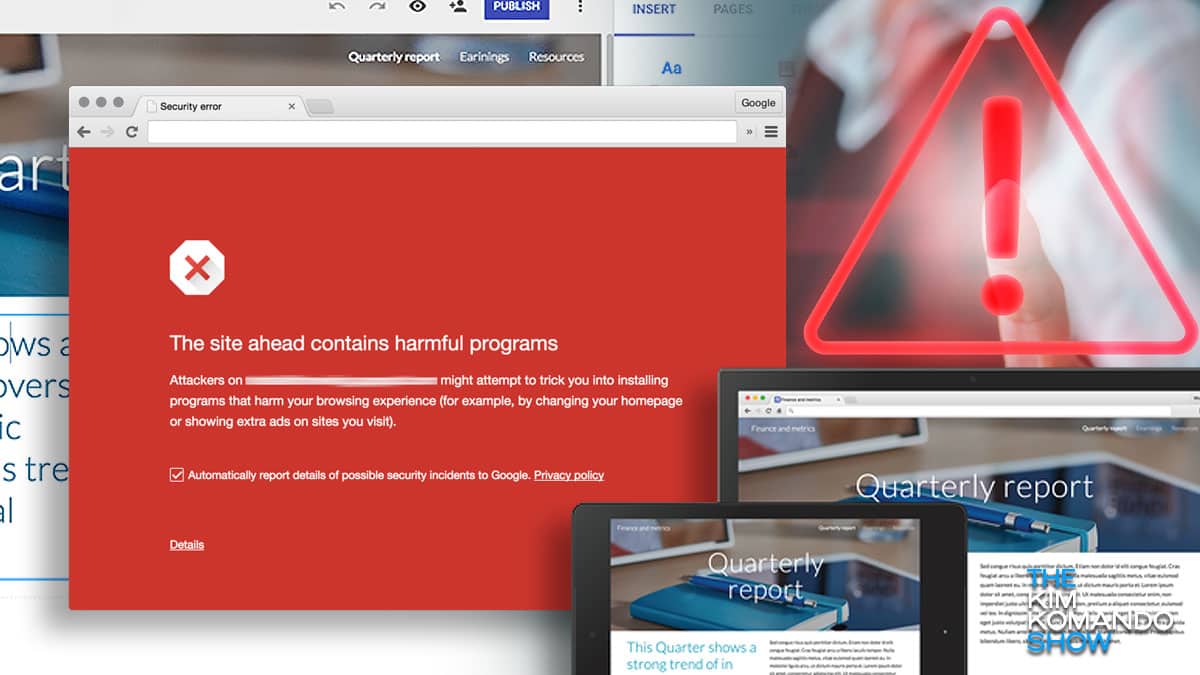Don’t suffer in silence: If you get scammed, report it. You’ll save someone else from being a victim and leave a paper trail if the crook that scammed you ever gets caught. You can report online scams at the Internet Crime Complaint Center and even share your story on Reddit’s r/scams.
See this in a URL? Don't click!

Platforms such as Wix and Squarespace are hugely popular, as you can quickly design a website in a few clicks with no technical knowledge. Did you know that Google offers a free website creator? It’s not well known but is gaining popularity. It’s called Google Sites. The problem is criminals are using the platform to create spoofed sites, trying to rip you off.
Read on to find out how scammers use Google Sites in all the wrong ways.
Criminals using Google Sites to create spoofed websites
While it isn’t as well-known as Gmail or Sheets, Google Sites lets anybody with a Google account create a basic website with limited functionality. First launched in 2008, it is part of the Google Docs Editors suite and guides you through the creation process.
Once your website is complete, you can assign it a custom URL that uses the google.sites.com domain. But it’s this naming convention that scammers use to exploit you into handing over credentials to banking sites, payment services and more.
The scam works similarly to other spoofed websites, where criminals create a near-identical copy of a legitimate site. At first glance, the google.sites.com domain is easy to overlook when searching for a specific business or service.
For example, if you do a Google Search for a payment platform like PayPal, you could see results with google.sites in the URL. When you click the link, it will look like the official PayPal login screen.
But in reality, signing into your account is handing over your credentials to thieves. Now they can access your PayPal account can cause plenty of financial havoc.
How to avoid spoofed websites
Be cautious when visiting any website that requires you to sign in or divulge sensitive information. There are a few ways to keep your personal information and finances protected. Spoofing is so out of control that the FBI is trying to raise awareness. Here are suggestions from the FBI:
- Verify the spelling of web addresses, websites, and email addresses to identify imitations.
- Look for a padlock icon next to the URL in the address bar to verify that the website you visit has a Secure Sockets Layer (SSL) certificate.
- Don’t click links found in Google Search results. Try getting into the habit of typing the URL of the website you want to visit directly into the address bar.
- Ensure operating systems and applications are updated to the most current versions.
- Have antivirus software updated and running on all of your devices. We recommend our sponsor, TotalAV. Right now, get an annual plan with TotalAV for only $19 at ProtectWithKim.com. That’s over 85% off the regular price!
- Disable or remove unneeded software applications.
- Use two-factor authentication when possible, via biometrics, hardware tokens, or authentication apps.
If you or someone you know has come across what you believe to be a spoofed unemployment benefit site, report it to the FBI’s Internet Crime Complaint Center at www.ic3.gov.
7 things to do after a hacker breaks into your computer

I always feel sympathy when I hear about hackers breaking into someone’s computer. I felt terrible when Phillis from Orlando Beach, FL, called the show and said hackers stole $150,000 from her brother’s PC. If you’ve ever been hacked, you know how scary it is.
🚨 Data held hostage by LockBit ransomware? Don’t negotiate with terrorists. The FBI is giving out 7,000 free decryption keys you can use to unlock your data without paying a ransom. If you’re affected, you’ll probably know it (i.e., you won’t be able to access files on your computer). Go to the FBI’s Internet Crime Complaint Center to snag your free key.
Avoid this clever scam tactic being used on Facebook Marketplace

Whenever you deal with strangers online, you must be vigilant for scammers. While social media platforms are popular hunting grounds, criminals have equal success with online classified websites.
Every month there seems to be a new Facebook Marketplace trick or eBay scam looking to steal your money or personal information. Some are easy to spot, but criminals often change tactics to disguise their motives.
SIM swapping is one of the most dangerous phone hacks - And it's on the rise

You might assume that the SIM card in your mobile phone is safe. After all, it is firmly embedded into your device, and someone would need to take it out physically to access it. But that isn’t the only method. Tap or click here for an in-depth look at SIM swapping scams.
Protect your wallet: There's a new twist on ATM and wire transfer scams

The holiday season is fast approaching, which means scammers and cybercriminals will be out in full force once again. Tap or click here for details on a holiday decoration scam already circulating. Every year around this time, the number of security threats skyrocket.
Ransomware: Yes, you're vulnerable to this, too. Here's how to stay safe
Online scams have been around since the internet entered the public space. When online shopping and surfing were new, people didn’t consider fraud and crooks quickly moved their craft into the digital space.
We can now access the internet from anywhere thanks to smartphones, tablets and laptops. While convenient, this has only helped to spread crooked activity. With nearly 2 million apps in Apple’s App Store, some are inevitably fraudulent. Tap or click to see how bad apps have scammed iPhone users out of nearly $50 million.
Dangerous security issues found in millions of smart TVs

Smart TVs are computers just like your phone and laptop, and they’re vulnerable to the same kind of threats. If security holes exist in a smart TV model, it’s only a matter of time before hackers find a way to break in and control it.
FBI warning: Avoid these Microsoft and Google scams

Google and Microsoft are taking bold stances in the face of the coronavirus outbreak. Rather than upcharge customers forced to work from home, they’re actually offering their premium business services for free. This makes it easier for employees to operate remotely across the country.
